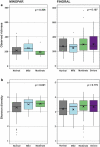Subgingival microbiome at different levels of cognition
- PMID: 36844899
- PMCID: PMC9946326
- DOI: 10.1080/20002297.2023.2178765
Subgingival microbiome at different levels of cognition
Abstract
Oral health and declining cognition may have a bi-directional association. We characterized the subgingival microbiota composition of subjects from normal cognition to severe cognitive decline in two cohorts. Memory and Periodontitis (MINOPAR) include 202 home-living participants (50-80 years) in Sweden. Finnish Oral Health Studies in Older Adults (FINORAL) include 174 participants (≥65 years) living in long-term care in Finland. We performed oral examination and assessed the cognitive level with Mini Mental State Examination (MMSE). We sequenced the 16S-rRNA gene (V3-V4 regions) to analyse the subgingival bacterial compositions. The microbial diversities only tended to differ between the MMSE categories, and the strongest determinants were increased probing pocket depth (PPD) and presence of caries. However, abundances of 101 taxa were associated with the MMSE score. After adjusting for age, sex, medications, PPD, and caries, only eight taxa retained the significance in the meta-analyses of the two cohorts. Especially Lachnospiraceae [XIV] at the family, genus, and species level increased with decreasing MMSE. Cognitive decline is associated with obvious changes in the composition of the oral microbiota. Impaired cognition is accompanied with poor oral health status and the appearance of major taxa of the gut microbiota in the oral cavity. Good oral health-care practices require special deliberations among older adults.
Keywords: Oral health; cognition; cognitive decline; mini mental state examination (MMSE); older adults; subgingival microbiome.
© 2023 The Author(s). Published by Informa UK Limited, trading as Taylor & Francis Group.
Conflict of interest statement
No potential conflict of interest was reported by the authors.
Figures



References
LinkOut - more resources
Full Text Sources
